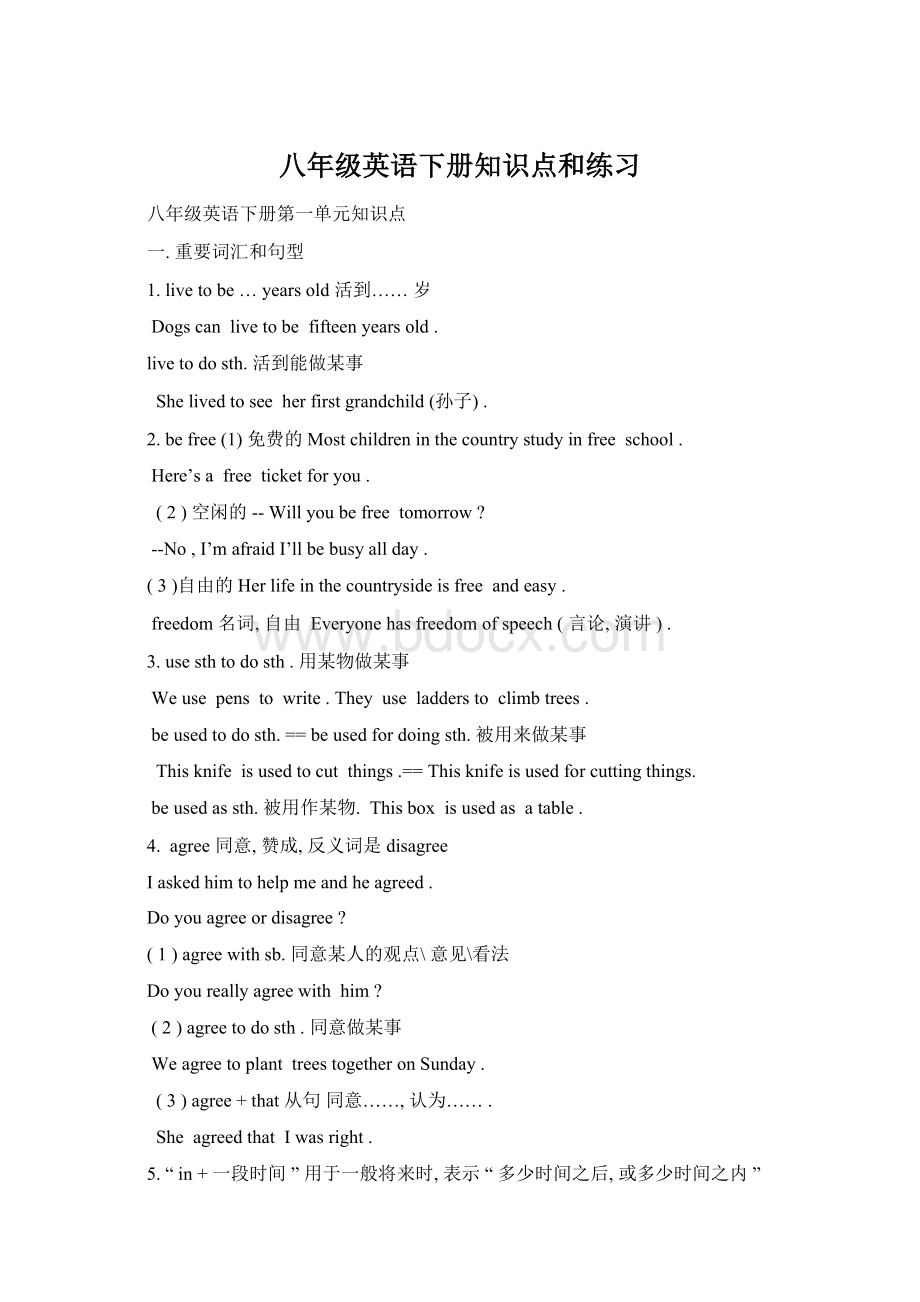八年级英语下册知识点和练习.docx
《八年级英语下册知识点和练习.docx》由会员分享,可在线阅读,更多相关《八年级英语下册知识点和练习.docx(112页珍藏版)》请在冰豆网上搜索。

八年级英语下册知识点和练习
八年级英语下册第一单元知识点
一.重要词汇和句型
1.livetobe…yearsold活到……岁
Dogscanlivetobefifteenyearsold.
livetodosth.活到能做某事
Shelivedtoseeherfirstgrandchild(孙子).
2.befree
(1)免费的Mostchildreninthecountrystudyinfreeschool.
Here’safreeticketforyou.
(2)空闲的--Willyoubefreetomorrow?
--No,I’mafraidI’llbebusyallday.
(3)自由的Herlifeinthecountrysideisfreeandeasy.
freedom名词,自由Everyonehasfreedomofspeech(言论,演讲).
3.usesthtodosth.用某物做某事
Weusepenstowrite.Theyuseladderstoclimbtrees.
beusedtodosth.==beusedfordoingsth.被用来做某事
Thisknifeisusedtocutthings.==Thisknifeisusedforcuttingthings.
beusedassth.被用作某物.Thisboxisusedasatable.
4.agree同意,赞成,反义词是disagree
Iaskedhimtohelpmeandheagreed.
Doyouagreeordisagree?
(1)agreewithsb.同意某人的观点\意见\看法
Doyoureallyagreewithhim?
(2)agreetodosth.同意做某事
WeagreetoplanttreestogetheronSunday.
(3)agree+that从句同意……,认为…….
SheagreedthatIwasright.
5.“in+一段时间”用于一般将来时,表示“多少时间之后,或多少时间之内”
Dinnerwillbereadyinhalfanhour.
They’llbebackinafewdays.
6.more,fewer,less
more是many和much的比较级,意思是“更多”,修饰可数名词的复数或不可数名词.
fewer是few的比较级,意思是“更少”,修饰可数名词的复数.
less是little的比较级,意思是“更少”,修饰不可数名词.
morepollutionfewerapplesfewerpeoplelessmoney
7.little,alittle,few,afew
little表示“少,少得几乎没有”,修饰不可数名词.
few也表示“少,少得几乎没有”,修饰可数名词的复数.
alittle表示“有一点点,但数量不多”,修饰不可数名词.
afew也表示“有一点点,但数量不多”,修饰可数名词的复数.
Heoftenfeelslonely,becausehehasfewfriendshere.
Thereislittlemilkinthefridge(冰箱).Wehavetobuysome.
---Howsoonwillhebeback?
---Inafewdays.
Thereisalittlewaterinthebottle,youcandrinkit.
8.take+冠词+交通工具==by+交通工具“乘坐……”
Iwenttoschoolbytrain==Itookthetraintoschool.
Youcantaketheno.2bustothesupermarket.
9.livein住在某地,livewithsb.和某人住在一起
IliveinBeijingwithmyparents.
10.fallinlovewithsb.\sth.爱上某人\某物
Theprettygirlfellinlovewiththehero.
Manychildrenfallinlovewithcomputergames.
fall
(1)跌倒,倒下Dannyfellinthesnow.
(2)掉下,落下Anapplefellfromthetree.
(3)(气温,价格)下降Thetemperaturehassuddenlyfallen.
(4)用作系动词,表示“变得……”,后常接形容词asleep,ill等作表语.
ShefellillassoonasshegottoLondon.
Hewasjustfallingasleepwhentherewasaknockatthedoor.
(5)用作名词,意为“秋天”==autumnTheywillcomehereinfall.
11.alone和lonely
alone副词,意为“单独的地,独自地”==byoneself,侧重于独自一人,无同伴,无其他人在场,显得孤立无援.
Theynextdayhewenttotheforestalone\byhimself.
Wecan’tfinishtheworkalone\byourselves.
Hewasaloneathome.
lonely形容词作表语,“孤独的,寂寞的”,强调人内心的孤独,寂寞,
也可用作定语,修饰名词,意为“偏僻的,荒凉的”
Hewastakentoalonelyisland.
Theoldmanlivesinalonelyvillage.
MrsmithlivedinBeijingalone,butheneverfeelslonely.
12.go+动词ing形式
goskating去滑冰goshopping去购物gofishing去钓鱼
gohiking去远足gocamping去野营goclimbing去登山
goswimming去游泳goboating去划船goskiing去划水
13.do+some+动词ing形式
dosomecleaning大扫除dosomecooking做饭dosomereading阅读
dosomeshopping购物dosomewashing洗衣服
14.on\attheweekend==on\atweekend在周末
15.dress穿衣dressup打扮dresssb.给某人穿衣服
dressoneself给自己穿衣服
Iwanttogototheparty.ButIdon’tknowhowtodress.
Inthemorning,italwaystakesheralongtimetodressup.
Sheisn’toldenoughtodressherself.canyouhelpmedressher?
puton,wear与dress
puton表示“穿上”,强调往身上穿衣时瞬间的动作
wear表示“穿着”强调穿上身后的状态
dress本身表示“穿衣”,其后不能跟表示服装的单词
Healwayswearsalongcoatinwinter.
It’scoldoutside.Putonyourcoat.
16.needtodosth需要做某事
needdoingsth==needtobedone需要做某事
It’sgettingcolderandcolder.youneedtowearwarmclothes.
Heistired.Heneedstorelax.
Theflowersneedwatering.==Theflowersneedtobewatered.
17.cometrue(希望等)实现,成为现实
Webelieveourgoodwishestoherwillcometrue.
Atlast,hisdreamofcomingtoBeijingcametrue.
cometrue是不及物动词词组,表示“(希望等)实现,成为现实”
achieve是及物动词词组,表示“实现(希望,梦想)”
Heworkshardtoachievehisdreams.He’ssurehisdreams
willcometrueoneday.
18.alot和alotof
alot代替不可数名词,可作宾语或状语,能修饰比较级.
Helearnedalotinthecountryside.
Hiswifewillbealotbetterthansheisnow.
alotof==lotsof用于修饰可数名词或不可数名词.
Therearealotofapplesinthebasket.
Thereisalotofwaterontheground.
19.helpwithsth.帮助某人做某事
Helpsb.withsth.帮助某人做某事
Helpsb.(to)dosth.帮助某人做某事
Helpsb.withdoingsth帮助某人做某事
Canyouhelpwiththecleaning?
ShewillhelpwithyourEnglish.
HeoftenhelpsmewithmyEnglish.
IamhelpingLucy(to)learntoswimmingthesedays.
Canyouhelpchildrenwithdancing?
20.Thereis\aresb.doingsth.有……正在做某事
Thetrafficisbusy.Therearesomecarscomingandgoing.
Look!
Thereisagirlcryingunderthetree.
21.overandoveragain一再地,反复地
Hesaiditoverandoveragain
Youneedtoremembersomewordsoverandoveragain.
22.seem系动词,“似乎,好象,看起来”.后接名词,形容词,动词不定式作表语.
Itseemsalovelycat.Theyseemedhappytoday.
Youdon’tseemtoliketheidea.
ItseemslikeyearssinceIlastsawyou.
(1)seemtodosth.好象做某事
Sheseemstolikehernewneighbor
(2)Itseems+that从句看起来……,似乎…….
Itseemsthattheywillwinthematch.
(3)itseemasif…看起来好象……,似乎…….
Itseemsasifshewasinadream.
23.asmuch\often\soon\carefulaspossible尽可能多\经常\快\细心地
24.possible的常用句型
Itispossibleforsb.todosth.
Itispossible+that从句
IthinkitispossibleforhimtolearnEnglishwell.
IthinkitispossiblethathecanlearnEnglishwell.
二.一般将来时:
1.一般将来时的用法:
(1)以现在为基点,将来某个时间要发生的动作或存在的状态。
常与表示将来的时间状语
tomorrow,nextweek,inafewdays,in+一段时间等连用。
其基本结构为:
肯定句:
主语+will+动词原形+时间状语。
否定句:
主语+will+not+动词原形+时间状语。
疑问句:
will+主语+动词原形+时间状语?
TheywillleaveforShanghainextweek.
Willyoubebackintwodays?
当主语是I或we时,问句中用shall,表示征求对方意见。
Whereshallwemeettomorrow?
shallwegotothezoo?
(2)表示计划、打算做某事,表示以决定的,很可能发生的事。
其基本结构为:
肯定句:
主语+begoingto+动词原形+时间状语。
否定句:
主语+be+notgoingto+动词原形+时间状语。
疑问句:
be+主语+goingto+动词原形+时间状语?
WhatareyougoingtodonextSunday?
I’mgoingtolistentomusic.
Lookattheclouds,thereisgoingtobeastorm.
2.以下几种情况,只可用shall,will表示将来,而不可用begoingto结构。
----表示有礼貌地询问对方是否愿意,或表示客气的邀请或命令时:
Willyoupleaselendmeyourbike?
----表示意愿时:
wewillhelphimifheasksus.
-----表示单纯性的将来,与人的主观愿望和判断无关:
Thesunwillriseat6:
30tomorrowmorning.
3.bedoing表示将来:
常用这种结构的动词有:
go,come,leave,arrive,travel,move,meet,fly,
stay,start,begin等,表示即将发生或安排好要做的事。
WeareleavingforLondon.Sheisgoingtheretomorrow.
4.beaboutto+动词原形表示即将发生的动作,意为“很快,马上”
Weareabouttoleave.我们马上就走.
beto+动词原形表示即将发生的动作或征求对方的意见:
Arewetogoonwiththiswork?
我们继续这项工作吗?
Theboyistogotoschooltomorrow.这个男孩明天要去工作.
5.用一般现在时表示将来的情况:
-----表示按规定或时间表预计发生的动作。
WearegoingtoChangchun,ourplanetakesoffat8:
00.
----当主句为一般将来时,在if,assoonas,until,when引导的状语从句中用一般
现在时代替一般将来时。
Ifitdoesn’trainthisafternoon,we’llhaveafootballmatch.
6.根据例子,和词组提示,构成类似对话。
Whatareyougoingtodotomorrow?
Iamgoingtoplanttrees.
Areyougoingtoplanttreestomorrow?
Yes,Iam.Iamgoingtoplanttreestomorrow.
No,Iamnot.Iamnotgoingtoplanttreestomorrow.
或whatwillyoudotomorrow?
Iwillplanttreestomorrow.
Willyouplanttreestomorrow?
Yes,Iwillplanttreestomorrow.\No,Iwon’tplanttreestomorrow.
(1)MrZhang,playbasketball,thisafternoon.
(2)LiuMei,visittheGreatWall,nextSunday.
(3)theSmiths,flytoEnglandforaholiday,nextmonth
一般将来时专项练习
1.You’dbettergotothestationbybus,thetrain_____inhalfanhour.
A.leavesB.wouldleaveC.isleavingD.hasleft
2.----Areyouready,Ann?
Theconcertisstarting.---Yes,I______.
A.willcomeB.shallcomeC.amcomingD.havecome
3.Remembertobuyanewspaperwhenyougoout.---Ok,I____forget.
A.can’tB.won’tC.don’tD.mustn’t
4.Whydon’tyoutryonthisjacket?
It___niceonyou.
A.islookingB.looksC.willlookD.haslooked
5.----Becarefulwhenyoucrossthestreet.----Yes,I_________.
A.willB.doC.canD.am
6.---Pleasedon’ttellanybodywhatIsaid.----Don’tworry,I______.
A.won’tB.wouldn’tC.don’tD.can’t
7.---Wewon’tseeBettythisevening.---Whynot?
_____totheparty?
A.Isn’tshecomingB.doesn’tshecome
C.didn’tshecomeD.hasn’tshecome
8.---Remembernottodothatagain.----______,Ihavelearnedmylessons.
A.Yes,IwillB.No,Iwon’tC.Yes,IdoD.No,Idon’t
9.---Youhaveleftthelighton.---Oh,soIhave.______andturnitoff.
A.I’mgoingB.I’llgoC.IgoD.Iwouldgo
10.---Writetomeassoonasyouarrivethere.----I_______.
A.mustB.shouldC.willD.can
三.therebe句型
(一)含义:
表示某地有某物
(二)therebe句型的一般现在时
肯定句:
1.Thereisapictureonthewall.
2.Thereissomewaterinthebottle.
3.Therearesomeapplesinthebasket.
4.Thereisabookandsomepensonthedesk.
5.Therearesomepensandabookonthedesk.
说明:
句子的主语是单数名词或不可数名词,用thereis.
句子的主语是复数名词,用thereare
句子中有两个以上(含两个)主语,由最靠近的主语决定be的形式.
否定句:
在is和are后面加not.isnot缩写成isn’t,arenot缩写成aren’t
Some改为any
一般疑问句:
把is和are调到句首,Some改为any.句末问号.
一般疑问句的回答:
Yes,thereis.\No,thereisn’t.